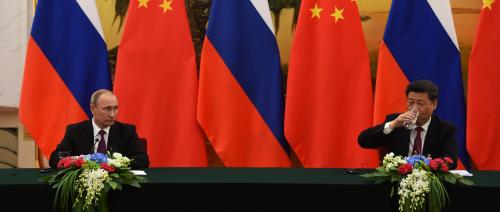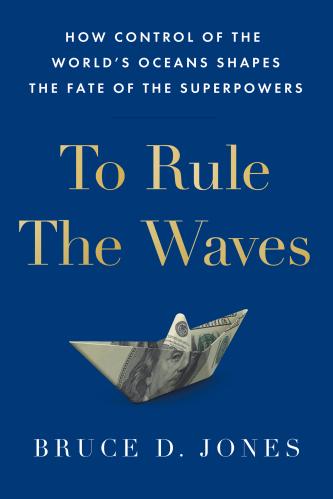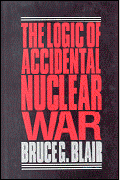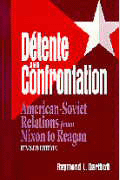Mr. Chairman, Mr. Ranking Member, members of the Committee, thank you very much for inviting me to testify this morning.
Since the end of the Second World War, American foreign policy has aimed at defending and extending a liberal world order that conforms to American interests and principles. It has done so not as a favor to others but based on the hard-won understanding that in the absence of such a world order, both American interests and our cherished principles will eventually be imperiled. This was the lesson that those who were “present at the creation” of the American-led world order learned 70 years ago, after two world wars and the rise of fascism and totalitarian communism. If we are not vigilant, we will have to learn that lesson all over again, and perhaps at even greater cost.
It has become common to say that the last 25-30 years of American foreign policy have been a failure. This betrays both a lack of historical memory and a lack of imagination. Which 25-year period of the last century would we rather have: the first 25 years of the 20th century, which gave us World War One, the breakdown of British-dominated world order, the Bolshevik revolution, and the birth of fascism? The second 25 years, which gave us the rise of Hitler and Stalin and Imperial Japan, World War Two, the communist revolution in China, and the imprisonment of half of Europe behind the Iron Curtain? The thirty years between 1950 and 1980, which despite the extraordinary success of the United States in establishing the secure basis of what used to be called the free world and which eventually produced the liberal world order we today enjoy, nevertheless also gave us the Korean War, the Vietnam War, three major wars in the Middle East, the Arab oil embargo, the Iranian Revolution, and the Iran hostage crisis?
The fact is that for all the difficulties of the past 25-30 years, for all the errors, of which there have been many—because this is the real world in which failure is more common than success—for all the costs in lives and treasure, this period has been by any reasonable historical measure one of remarkable success. From the 1980s onward, we saw the fall of Soviet communism and the Soviet empire, the liberation of central and eastern Europe, the spread of democracy in Asia and Latin America, a global prosperity unmatched in human history, and, very importantly, no conflict between the great powers. Throughout much of this period, in crises in the Balkans and in the Middle East, the United States and its allies have operated effectively to stem humanitarian disasters and put an end to brewing conflicts. Democratic government has spread throughout Asia and Latin America, regions which were dominated by dictatorships in previous decades. Despite the economic downturn following the 2008 financial crisis, this is has been a period of extraordinary prosperity by historical standards.
These past 25-30 years have also provided us a clear formula for success, a formula inherited from those early years after World War Two. By building and maintaining strong alliances with democratic nations and by supporting an open global economy that allows those nations to prosper, and which lifts billions of others in developing nations out of poverty, the United States can best protect its own security and the well-being of its own people. One need only think of the strong democratic alliances maintained during the 1980s, the relationships between Ronald Reagan and close allies like Margaret Thatcher, Helmut Kohl, François Mitterrand, and Yasuhiro Nakasone. Those bonds, together with a strong U.S. military and strong U.S. economy, prevailed in the Cold War, convinced Soviet leaders to concede peacefully, and established this extraordinary period in the history of international relations. It has not been perfect, because perfection in human affairs is not possible. But by any reasonable standard, this formula has been successful—and successful for the American people. It created a world order conducive to American interests and American values.
Today that order faces severe challenges, both from without and from within. The external challenges are obvious enough. Since 9/11 we have faced the threat of radical Islamic terrorism, which has proved resilient and to which we have responded inadequately. Iran’s efforts to acquire a nuclear weapon, and to spread its influence by military means throughout the Middle East and Persian Gulf, have helped destabilize a region that remains strategically relevant despite the declining American reliance on its oil. North Korea’s nuclear capabilities as well its ballistic missile capacities are growing.
Today, however, I would like to focus on what I believe to be the greatest threats that we are going to face in the years and decades, and those are threats posed by China and Russia. For while the other threats I have mentioned pose serious challenges, and in the case of terrorism obviously require the utmost vigilance, only these two great powers have the capacity to upend the world order which has long provided for Americans’ security and well-being. The unmistakable hegemonic ambitions of China and Russia threaten the stability and security of the world’s two most important regions, East Asia and Europe. These regions are vital to the United States both economically and strategically. They are the regions where two world wars originated in the first half of the 20th century and would be the locus of the next great war should the United States fail to play the role it has played over the past 70 years in undergirding their security and stability. The simple fact is, the era of great-power rivalries has returned. In the past these great-power competitions have led invariably to great-power wars. Managing these rivalries, avoiding war, and doing so without abandoning the liberal world order in the misguided belief that we will be spared when it collapses, is the greatest challenge we face today and in the years and decades to come.
The simple fact is, the era of great-power rivalries has returned. In the past these great-power competitions have led invariably to great-power wars.
Both China and Russia have much in common. Both are classic revisionist powers. Although both China and Russia have never enjoyed greater security from foreign attack than they do today—Russia has never been more secure from attack by its traditional enemies to the west, and China has never been more secure from attack by its traditional enemy in the east—both are dissatisfied with the current configuration of power in the world. Both seek to restore a hegemonic dominance in their regions that they enjoyed in the past. For China that means dominance of East Asia, with nations like Japan, South Korea, and the nations of Southeast Asia both acknowledging Chinese hegemony and acting in conformity with China’s strategic, economic, and political preferences. For Russia, it means hegemonic influence in the areas of Central and Eastern Europe which Russia has traditionally regarded as either part of its empire or part of its sphere of influence. Both seek to redress what they regard as an unfair distribution of power, influence, and honor in the American-led postwar global order. Being autocracies, both feel threatened by the dominant democratic powers in the international system and by the democracies on their borders. Both regard the United States as the principal obstacle to their ambitions, and therefore both seek to weaken the American-led international security order which stands in the way of their achieving what they regard as their rightful destinies.
The two great powers differ, so far, chiefly in their methods. China has until now been the more careful and cautious, seeking influence primarily through its great economic clout in the region and globally, and using its growing military power chiefly as a source of deterrence and intimidation. It has not resorted to the outright use of force yet, although its actions in the South China Sea are military in nature and carry the risk of producing military conflict. China’s willingness to use force cannot be ruled out in the future, and possibly in the near future. Revisionist great powers with growing military capabilities invariably make use of those capabilities when they believe the possible gains outweigh the risks and costs. If the Chinese perceive America’s commitment to its allies and its position in the region to be weakening, or its capacity to make good on those commitments to be declining, then they will be more inclined to attempt to use the power they are acquiring in order to achieve their objectives.
Russia, on the other hand, has already been far more aggressive. It has invaded two neighboring states—Georgia in 2008 and Ukraine in 2014—and in both cases has hived off significant portions of those two nations’ sovereign territory. It has also projected military force into Syria, lending its military support to the Syrian regime’s efforts to crush all opposition, including by the aerial bombing and massacre of civilian populations. Russia has also been aggressive in other ways. It has wielded its control of European energy resources as a weapon. It has used cyberwarfare against neighboring states. It has engaged in extensive information warfare on a global scale. And it has interfered directly in Western electoral processes, both to try to influence their outcomes and more generally to discredit the democratic system. This past year, Russia for the first time employed this powerful weapon against the United States, heavily interfering in the American electoral process with as yet unknown consequences.
Although Russia, by any measure, is the weaker of the two great powers, it has so far had more success than China in accomplishing its objective of dividing and disrupting the West. Its interference in Western democratic political systems, its information warfare, and perhaps most importantly, its role in creating increased refugee flows from Syria into Europe have all contributed to the sapping of Europeans’ confidence in their political systems and their established political parties. Its military intervention in Syria, contrasted with American passivity, has exacerbated already existing doubts about American staying power in the region. China, until recently, has succeeded mostly in driving American allies closer to the United States out of concern for growing Chinese power. That could change quickly, however, and especially if the United States continues on its present trajectory. We could soon face a situation where both great revisionist powers are acting aggressively, including by military means, which would pose an extreme challenge to American and global security.
The return of this great-power challenge has come just at the moment when American and Western will, confidence, and capacity to meet the challenge have been in decline. The present administration has emphasized global retrenchment at the expense of engagement and although its stated policy has aimed to “rebalance” American foreign policy, the overall effect of its statements and actions has been to raise doubts around the world about America’s staying power as the critical supporter of the present global order. Its early attempt to “reset” relations with Russia was a first blow to America’s reputation as a reliable ally, partly because it came just after the Russian invasion of Georgia and thus appeared to be almost a reward for Russian aggression; partly because the “reset” came at the expense of planned programs of military cooperation with Poland and the Czech Republic that were jettisoned to appease Moscow; and partly because this effort at appeasement came just as Russian policy toward the West, and Vladimir Putin’s repressive policies toward the Russian people, were hardening. Then in 2014, the West’s collective response to the Russian invasion of Ukraine and seizure of Crimea, though better than the Bush administration’s response to the invasion of Georgia—Europe and the United States at least imposed sanctions after the invasion of Ukraine—still indicated reluctance on the part of the U.S. administration to challenge Russia in what the American President regarded as Russia’s own sphere of interest. In Syria, the present administration practically invited Russian intervention, if only through American passivity, and certainly did nothing to discourage it, thus reinforcing the already prevalent impression of an America in retreat in that region (an impression initially created by the unnecessary and unwise withdrawal of all American troops from Iraq). Subsequent Russian actions which increased the refugee flow from Syria into Europe also brought no American response, despite the evident damage of those refugee flows to European democratic institutions. The overall impression given by the present administration has been that none of this is America’s problem.
In East Asia this administration’s otherwise commendable efforts to assert America’s continuing interest and influence have been undermined by a failure to follow through with policies to support the rhetoric. The military component of the so-called “Pivot” has been hollow due to inadequate defense spending which has made it impossible to enhance the American military presence in a meaningful way. The important economic component of the pivot, meanwhile, represented most prominently by the Trans-Pacific Partnership agreement, was undermined this year when both leading presidential candidates announced their opposition to the agreement. The general perception of American global retreat and retrenchment, encouraged both by presidential rhetoric and by administration policies, especially in the Middle East, has also been noticed in Asia, where allies are left wondering how reliable the U.S. commitment may be when facing the challenge posed by China, for instance, in the continuing conflict over the South and East China Seas.
The perceived weakness and withdrawal of the United States as a result of the present administration’s policies and rhetoric has unfortunately been greatly exacerbated by the comments of the president-elect and his proxies during this year’s campaign. Suggestions that the United States might not come to the defense of NATO allies if attacked by Russia, that it is not worth going to war over a country that is “in the suburbs of St. Petersburg,” that it is a “real problem” that the United States has to come to Japan’s defense if it is attacked, and in general that the United States should fulfill its security commitments to other nations only if it makes economic sense—all these have only increased doubts about America’s reliability as an ally and partner.1 They have given the clear impression to both friends and potential adversaries that the United States is turning inward, abjuring responsibility for global security, and effectively ceding hegemonic dominance of Europe and East Asia to Russia and China.
As history has shown, however, a world order collapses with remarkable rapidity and with great violence.
The conjunction of these two trends—the growing ambition and aggressiveness of the two revisionist great powers and the increasing global perception (and perhaps reality) of a United States withdrawing from its international responsibilities to provide security—is at some point going to produce a dangerous crisis, or more likely, multiple simultaneous crises. Americans have tended to take the fundamental stability of the international order for granted, even while complaining about the burden the United States carries in maintaining that stability. As history has shown, however, a world order collapses with remarkable rapidity and with great violence. The apparent calm of the 1920s became within a decade the crisis-ridden 1930s, eventually culminating in world war. Continued American withdrawal from its global role could quickly tempt the rival great powers to seize the moment and try to reshape fundamentally the power structures in East Asia and Europe, both of which are of vital strategic and economic importance to the United States. At that point the United States would be faced with the choice of responding with the necessary force or acquiescing.
The goal of American policy now should be to avoid those crises and confrontations by moving quickly to re-establish the U.S. position as the principal upholder of the international order. That means reaching out immediately both publicly and privately to reassure allies in both Europe and Asia that the United States will not only make good on its commitments but intends to bolster its capacity to do so. These reassurances must therefore be accompanied by an immediate end to the sequester and a substantial increase in defense spending in line with the recommendations of recent secretaries of defense. Nothing would send a stronger signal that the United States is not engaged in a withdrawal from the world but means to continue playing its role as the principal upholder of the international order.
The incoming administration must also find a way to move forward with the Trans-Pacific Partnership in some form. That agreement, like most trade agreements, is not just about trade. It is a strategic investment in security and stability in East Asia, a low-cost and low-risk way of ensuring the United States and its friends and allies in the region remain close and united in the face of possible Chinese pressures.
Finally, there is the question of Russian interference in the most recent American presidential election. Some may not view this as a strategic and national security matter, but it is. Russian interference in Western democratic political processes has become a major element of Moscow’s strategy to disrupt, divide, and demoralize the West. The tactics it has recently employed in the United States it has already used in elections and referendums across Europe, including most recently in Italy, and will likely use again in France and Germany. For the United States to ignore this Russian tactic, and particularly now that it has been deployed against the United States, is to cede to Moscow a powerful tool of modern geopolitical warfare. It is extraordinary that the United States government has taken no act of retaliation. And it is unconscionable, and an abdication of responsibility, that Congress has not launched an investigation to discover exactly what happened with a view to preventing its recurrence in the future. One hates to think that because the Republican Party was the beneficiary of Russian intervention in this election that as the majority party in both houses of Congress it has no interest in discovering the truth about the foreign government’s assault on American democratic processes.
-
Footnotes
- On CBS This Morning on July 21, 2016, Newt Gingrich characterized Estonia as “in the suburbs of St. Petersburg.” See: Flores, Reena (2016, July 21) Newt Gingrich: NATO countries “ought to worry” about U.S. commitment. CBS This Morning. Retrieved from http://www.cbsnews.com/news/newt-gingrich-trump-would-reconsider-his-obligation-to-nato/. President-elect Donald Trump described a “real problem” in the U.S.-Japan defense relationship in his March 2016 interview with David Sanger and Maggie Haberman of The New York Times, see Haberman, Maggie and David Sanger (2016, March 26) Transcript: Donald Trump Expounds on His Foreign Policy Views. The New York Times. Retrieved from http://www.nytimes.com/2016/03/27/us/politics/donald-trump-transcript.html?_r=0.
The Brookings Institution is committed to quality, independence, and impact.
We are supported by a diverse array of funders. In line with our values and policies, each Brookings publication represents the sole views of its author(s).










Commentary
TestimonyEmerging U.S. defense challenges and worldwide threats
December 6, 2016
Robert Kagan testifies before the Senate Armed Services Committee on threats to the liberal international order that the United States has led since World War II. Watch the hearing live or read the full testimony below.